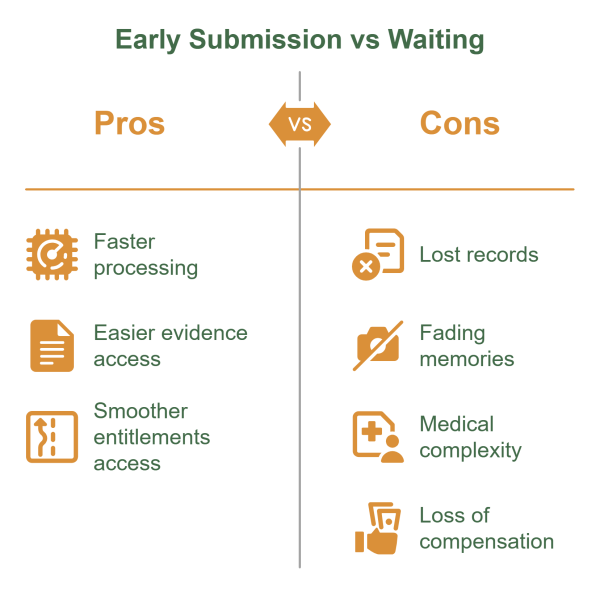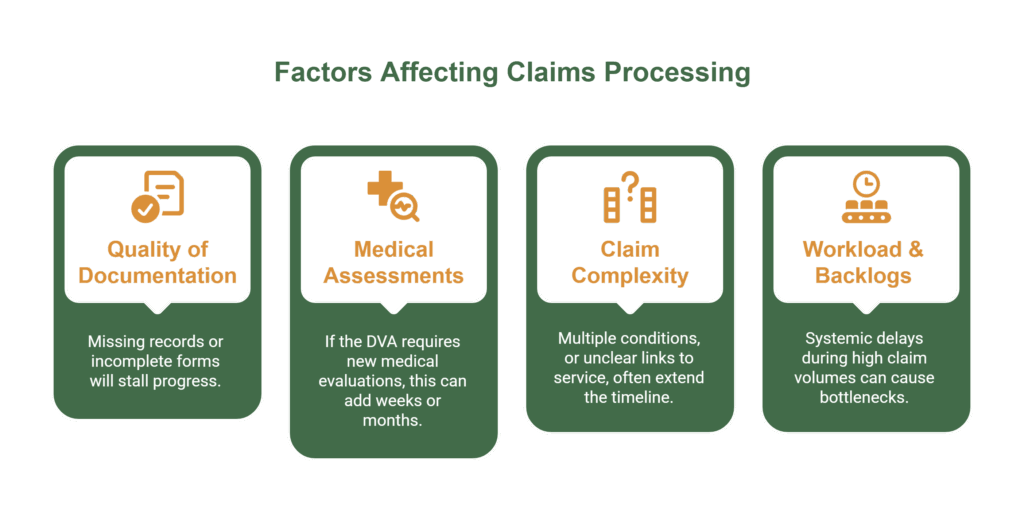When it comes to lodging a claim with the Department of Veterans’ Affairs (DVA), there’s one question that crops up time and time again: Is there a statute of limitations?
Here’s the straight answer: No, there isn’t.
Australian veterans can submit a claim for service-related conditions at any point in their lives. That means decades can pass after discharge, and you’re still entitled to the same access to the system as someone who files the day after leaving the ADF or while still in service.
This blog unpacks what that actually means—why the law is on your side, why sooner is still better, and how to navigate the process with confidence.
Key takeaways
- Veterans can lodge a claim at any point—there’s no statute of limitations, no matter how long it’s been since discharge.
- Submitting a claim early can speed things up, make gathering evidence easier, and may result in a higher compensation amount.
- Even if your condition surfaced years after service—like PTSD or cancer—you can still claim.
- DVA can pursue overpayments for up to six years, but there’s no deadline for you to apply for support. Let me know if you'd like these tailored for a visual or downloadable format. Ask ChatGPT
No Clock, No Cut-off: Claiming Whenever You’re Ready
When it comes to DVA claims, time is not your enemy.
There is no statute of limitations for lodging a claim for a service-related injury, illness or condition. Whether you were discharged last year or left the forces several decades ago, your eligibility remains intact.
This open-ended window applies across the key legislative frameworks that govern veteran entitlements:
- MRCA – Military Rehabilitation and Compensation Act 2004
- DRCA – Safety, Rehabilitation and Compensation (Defence-related Claims) Act 1988
- VEA – Veterans’ Entitlements Act 1986
Each of these laws recognises that some conditions—especially those related to mental health or exposure—can take years to appear. The system is built to account for that.
So whether you’re dealing with a long-term injury, delayed-onset PTSD, or a condition that only surfaced well after discharge, support is still available.
Don’t know where to start?
Chat to the experts at VetComp, and we can help with every step of the process.
Why You Shouldn’t Wait to Make Your Claim
There might not be a deadline, but that doesn’t mean it’s worth putting off. Lodging your DVA claim sooner can make the process smoother and help you access support faster.

💡 Why early submission is a smart move:
- Faster Processing: The sooner your paperwork lands, the sooner it gets assessed. Simple claims can move quickly, while complex ones benefit from an early start.
- Easier Access to Evidence: Records are fresher. Witnesses, medical reports, and service documentation are more readily available and reliable.
- Smoother Access to Entitlements: Early lodgement means you can start receiving compensation, health care, or rehabilitation services without unnecessary delays.
⚠️ The risks of waiting:
- Lost Records: Older service or medical documents can be hard to track down, especially if they were created before digital records were common.
- Fading Memories: Over time, it becomes harder to recall important details or find people who can back up your story.
- Medical Complexity: As time goes on, conditions can worsen or become mixed in with other health issues, making it harder to link them clearly to your service.
- Loss of Compensation: Compensation is partly based on your age and life expectancy. Lodging a claim later in life can sometimes mean receiving less than you might have earlier.
In short: you can lodge late—but life is easier when you lodge early. We understand that it can be daunting, though, which is where we come in.
Book in for your free claims consultation to see how we can help ease your burden.
The Waiting Game: How Long Does It Take?
Submitting a claim is the first step. What happens next—and how long it takes—depends on the type of claim, how complex it is, and how complete your documentation is.
Simple Claims
Straightforward claims with clear links to service and all the necessary documentation can often be processed within a few weeks to a couple of months. These usually involve conditions that are well recognised and don’t require much follow-up or investigation.
Complex Claims
More complex cases—like those involving psychological injuries, multiple conditions or detailed medical assessments—can take up to a year or more. These claims often require coordination with healthcare providers, access to additional service records and input from specialist doctors.

📦 What Affects Processing Time?
- Quality of Documentation: Missing records or incomplete forms will stall progress.
- Medical Assessments: If the DVA requires new medical evaluations, this can add weeks or months.
- Claim Complexity: Multiple conditions or unclear links to the service often extend the timeline.
- Workload & Backlogs: At times, systemic delays (as reported during periods of high claim volumes) can cause bottlenecks.
What If Your Condition Appears Years After Service?
Military service can leave lasting effects, and for many veterans, those impacts may not surface until years after discharge.
If you’re facing a condition that’s only recently emerged, you’re still entitled to lodge a DVA claim. This includes:
- Mental health conditions such as PTSD, anxiety, depression
- Cancers linked to hazardous exposure or military operations
- Chronic illness tied to environmental or chemical exposure during service
Australia’s veteran compensation system recognises that some injuries—especially invisible wounds and delayed illnesses—don’t show themselves straight away. That’s why there’s no statute of limitations on lodging a claim.
🤝 Help Is Available
You don’t have to figure this out on your own. The team at VetComp can:
- Help you identify service links to your condition
- Connect you with veteran-friendly medical providers
- Assist with gathering evidence
- Represent you in the claims process
Sounds like the kind of help you need? Book in for a free consultation today.
Debt Recovery and the Only Time Limit That Exists
While there’s no time limit for submitting a claim, one deadline does apply—and that’s in relation to debt recovery.
If the DVA finds that a veteran has been overpaid, they have up to six years to begin formal recovery action. This is called the statute of limitations on debt recovery, and it sets a clear timeframe for how long the DVA can seek repayment.
🔍 What It Doesn’t Affect
- This time limit does not apply to your ability to lodge a claim.
- It also doesn’t reduce or cancel any entitlements owed.
- Debt recovery and claim submission are legally separate processes.
In short, while there may be a limit on how long the government can chase you for an overpayment, there’s still no limit on when you can apply for support.
Your Service Has No Expiry Date
There’s no time limit on the sacrifices you’ve made. And when it comes to claiming what you’ve earned, the door is always open.
It doesn’t matter if it’s been a year or half a lifetime since you left the Defence Force—DVA will still consider your claim. That’s not just policy. It’s a reflection of Australia’s ongoing responsibility to the people who’ve served.
You served this country. Now it’s time for the country to serve you.
Thinking about lodging a claim? Don’t wait. Get the support you deserve. Reach out today.
FAQs
We’ve gathered our most commonly asked questions here, so you can feel informed, at ease, and ready to take the next step toward the support and benefits you deserve.
Can I claim for more than one condition?
Yes, absolutely. You can submit claims for multiple service-related conditions, whether they’re physical, psychological, or both. Each condition is assessed on its own merits, and organisations like VetComp can help compile, lodge, and manage your claims efficiently.
What if I’ve been denied before?
A denial isn’t the end—it’s often the beginning of a review or appeal process. If you’ve been knocked back, VetComp can assess your situation and help you gather the right documentation or evidence to strengthen your case the second time around.
Do I need to go through Centrelink or MyService?
Most claims are now submitted through MyService, DVA’s online platform. While Centrelink handles other government payments, it’s not required for DVA claims. If online systems seem overwhelming, VetComp can handle the digital side of things for you.
Is there a cost to using an advocate like VetComp?
VetComp operates on a no-win, no-fee model. The veterans we support come first, and we are motivated to see you and your service properly recognised. We will walk you through the service fee during your consultation—no surprises, just support.
Can I still claim if I’ve moved overseas?
Yes. As long as you have served in the ADF, your right to lodge a claim remains—no matter where you are in the world. VetComp can assist remotely, helping you prepare and submit claims across borders.
What happens if my condition worsens over time?
If your condition deteriorates, you can apply to have your claim reassessed. This can lead to increased compensation or additional support. VetComp can handle reassessments and guide you through the process with precision.
Is PTSD hard to claim for?
It can be more complex, but it’s absolutely claimable—and 100% worth pursuing. VetComp specialises in psychological injury claims and can connect you with mental health professionals and evidence-based assessments to support your case.



